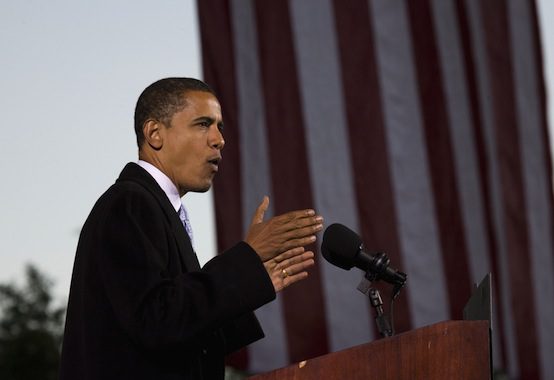The Case Obama Should Make

I’ve been arguing in this space that President Obama’s main problem isn’t that the economy is lousy (it was worse in 1936, and it wasn’t exactly fantastic in 1948 or 1984), nor that he hasn’t accomplished anything (he unquestionably has a record to run on, and while it isn’t overwhelmingly popular, it’s substantially more popular than what the Republicans are running on), but that he doesn’t have a substantial positive agenda, specifically for economic recovery. The Obama agenda is, in a nutshell: prevent a slide into outright depression (done); extend the safety net to cushion the long-lingering consequences of the recession (done); and wait for the economy to heal on its own (ongoing).
When I mentioned in my last post that Obama needed to run on a positive agenda, I immediately got the response, “what about the American Jobs Act“? But there are a variety of problems with that example. First, Obama isn’t running on that bill. He proposed it, and he made an issue of it for a while, but it hasn’t been a central theme of the campaign.
But more important, the bill is overwhelmingly a holding action – aimed not at setting the economy on a new path but further cushioning the impact of the lingering recession. The biggest components are payroll tax cuts, aid to the states to prevent public-sector layoffs, and further extension of unemployment benefits. As such, it is very difficult to sell as part of a recovery narrative. If a $1 trillion annual deficit won’t buy you an adequate recovery in demand, why should more of the same medicine do the trick?
A narrative for recovery needs to talk about setting the country on a path toward renewed and robust employment growth. There may be a story to tell about how increased government regulation will promote that growth – but making it easier to sue employers for discriminating against the long-term unemployed isn’t that story.
There are a host of factors related to our economic doldrums that the Obama campaign is not talking about. Some examples off the top of my head:
- Housing. The usual way we dig our way out of recessions is through low interest rates, which make it cheaper to refinance (and also inflate housing values, making it possible to borrow additional money against inflated equity). That’s what we did, on steroids, at the end of the last recession. Now, in the wake of the collapse of the housing bubble, with so many houses under water, that channel hasn’t proven especially effective, and as a consequence consumer demand has remained very low. If you believe this story, and I do, there are broadly speaking two possible responses: promote higher inflation, which will spark higher nominal housing prices and reduce the real value of housing debt; or intervene directly in the foreclosure market to promote cramdowns. Personally, I favor the latter approach. The Obama Administration hasn’t really advocated either in a serious way. As a consequence, they have nothing substantive to say about how they are going to “fix” the housing market.
- Banking. The economic crisis began with the financial crisis. The financial crisis, in turn, was caused by epic-scale malinvestment in the housing market through structured products, which left bank balance sheets in tatters. The Geither/Bernanke approach to cleaning up those balance sheets has been to encourage the banks to recapitalize through profits. And the banks have set about to do just that, earning a small amount in inflated reserves that they hold at the Fed and earning more on trading enterprises. What isn’t happening nearly enough is an expansion of direct lending. Getting banks to re-focus on that core business is going to require regulatory changes – changes to bank capital rules, changes to derivatives regulation, etc. There’s increasing recognition across the political spectrum, not just on the left, and even within the financial sector that the path banking has been on since the 1990s is the wrong one. But the Obama Administration has nothing to say about what a new regulatory path for the banking sector – not even in general terms.
- Spending priorities. The Obama Administration talks periodically about the need to invest more in infrastructure – where the United States lags woefully behind much of the world and behind its own historic investment level. But it has said very little about how to spend that money more efficiently – what regulatory changes might be made to get more bang for the buck. The story of the ill-fated High Speed Rail initiative – a story of how a big-ticket project becomes a meal-ticket project, and thereby becomes a no-ticket project – tells it all. But it’s not an inevitable feature of infrastructure spending – it’s not the story you’d tell about Germany, or France. Nor has the Obama Administration ever talked about what government spending might need to trade off to make a permanent increase in infrastructure spending more sustainable. Right now, for example, we spend a historic low of 2.4% of GDP on infrastructure spending. But we spend nearly 4% on defense. Don’t those two numbers sound backwards?
I could go on to talk about tax reform (Obama should be advocating a progressive version of cut-loopholes-and-cut-rates), trade policy (currently devoted to promoting those leading industries – pharmaceuticals, software, agribusiness, entertainment – that probably have the least widespread employment impact), etc. And no doubt I will in further posts.
But the larger point is: the Obama Administration’s biggest problem has not been radicalism. It has been a reluctance to challenge the accepted ways business is and has been done. As a consequence it doesn’t really have a change narrative – the way forward, when you look closely at it, is really a holding action to prevent us from moving backward.
Comments